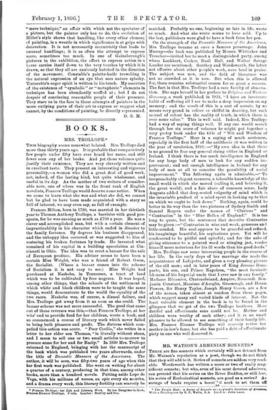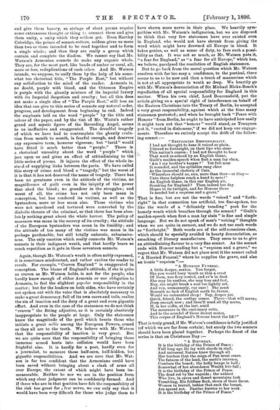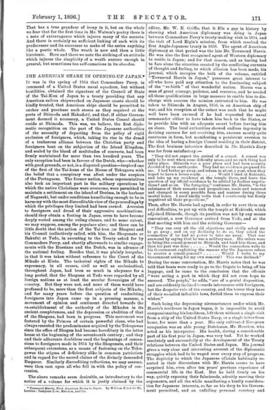MR. WATSON'S ARMENIAN SONNETS.*
THESE are fine sonnets which certainly will not detract from Mr. Watson's reputation as a poet, though we do not think that they will add to it. Series of sonnets are seldom very read- able. Wordsworth has written a score or two of really mag- nificent sonnets; but who, even of his most devoted admirers, can pretend that his series on the River Duddon, or still less, his series of Ecclesiastical sonnets, are good as a series P As strings of beads require a beatit'd neck to set them off
RS
• The Purple East: a Serifs of Bonnets onv negland's Desertion of Armonto. Witb a Frouttspiece by G. F. Watts. ILA. Lowlon : John Lane. and give them beauty, so strings of short poems require some extraneous thought or thing to connect them and give them unity, a unity which they seldom get. Even Hartley Coleridge, the prince of sonnet-writers, seldom gives us more than two or three intended to be read together and to form a single whole ; and then they are really a group wh;ch contain and complete the diadem. We cannot say that Mr. Watson's Armenian sonnets do make any organic whole. They are, for the most part, like beads of amber or coral, all, more or less, reduplications of each other. And Mr. Watson intends, we suppose, to unify them by the help of his some- what too rhetorical title, "The Purple East," but without any satisfaction to the mind of the reader. Armenia is, no doubt, purple with blood, and the Ottoman Empire is purple with the ghastly mixture of its imperial luxury with its Imperial despotism and cruelty ; but all this does not make a single idea of "The Purple East," still less an idea that can give to this series of sonnets any natural order, progress, and development from beginning to end. Indeed the emphasis laid on the word " purple " by the title and colour of the paper, and by the tint of Mr. Watts's rather grand and mystic figure of the Recording Angel, seems to us ineffective and exaggerated. The dreadful tragedy of which we have had to contemplate the ghastly evolu- tion from month to month, is fearful enough, and deserves any expressive term, however vigorous; but "lurid" would have fitted it much better than "purple." There is a rhetorical unreality about the word " purple " which jars upon us and gives an effect of attitudinising to the little series of poems. It injures the effect of the whole in- stead of supplying links between the parts. We have called this story of crime and blood a "tragedy," but the worst of it is that it has not deserved the name of tragedy. There has been no greatness even in the attitude of the victims, no magnificence of guilt even in the iniquity of the power that shed the blood ; no grandeur in the struggles ; and worst of all, the crime has not only been mean in conception, but has rendered its victims, as well as the bystanders, more or less mean also. Those victims who were not murdered and tortured were converted by the diabolic threats of the criminal, so that there has been abso- lutely nothing great about the whole horror. The policy of massacre was mean in the secrecy of its cruelty; the attitude of the European bystanders was mean in its timidity; and the attitude of too many of the victims was mean in its perhaps pardonable, but still totally unheroic, submissive- ness. The only emotion which really connects Mr. Watson's sonnets is their indignant wrath, and that hardly bears so much repetition as it gets in these seventeen sonnets.
Again, though Mr. Watson's wrath is often nobly expressed, it is sometimes misdirected, and rather excites the reader to revolt. For example, "Craven England" is exaggerated in conception. The blame of England's attitude, if she is quite as craven as Mr. Watson holds, is not for the people, who hardly know enough of either Armenia or our obligation to Armenia, to feel the slightest popular responsibility in the matter; but for the leaders on both sides, who have certainly not spoken out with the voice that is absolutely necessary to make a great democracy, full of its own cares and toils, realise the sin of inaction and the duty of a great and even gigantic effort. And even in the case of the statesmen we do not think "craven" the fitting adjeotive, as it is certainly absolutely inappropriate to the people at large. Only the statesmen know the magnitude of the peril which besets those who initiate a great ninie among the European Powers, armed as they all are to the teeth. We believe with Mr. Watson that the responsibility of inaction is very great. But we are quite sure that the responsibility of bringing these immense armed hosts into collision would have been frightful also. It is hardly for a poet, hardly even for a journalist, to measure these half-seen, half-hidden, but gigantic responsibilities. And we are sure that Mr. Wat- son is far too confident that the Armenians could have been saved without bringing about a clash of arms all over Europe, the extent of which might have been im- measurable. Neither he nor we are in the position from which any clear judgment can be confidently formed. And if those who are in that jilosition have felt the responsibility of the risk too great for frir nerve, we can only say that it would have been very dileult for those who judge them to have shown more nerve in their place. We heartily sym- pathise with Mr. Watson's indignation, but we are disposed to think that very few statesmen have ever existed even in England, who would not have shrunk from giving the word which might have drowned all Europe in blood. It takes genius, as well as sense of duty, to face such a possi- bility as that. It was not so much, as Mr. Watson puts it, "a fear for England," as "a fear for all Europe," which has, we believe, paralysed the resolution of English statesmen.
But to go back from the moral question which Mr. Watson resolves with far too easy a confidence, to the poetical, there seems to us to be now and then a touch of mannerism which is not at all appropriate to wrath so deep. We heartily go with Mr. Watson's denunciation of Sir Michael Hicks-Beach's repudiation of all special responsibility for England in this matter. When his own chief, Lord Beaconsfield, put the article giving us a special right of interference on behalf of the Eastern Christians into the Treaty of Berlin, he accepted a very great responsibility, against which at the time many statesmen protested ; and when he brought back "Peace with Honour "from Berlin, he ought to have anticipated bow easily it might turn out that " honour " would stand, as Tennyson put it, "rooted in dishonour," if we did not keep our engage- ments. Therefore we entirely accept the drift of the follow- ing sonnet :—
" REPUDIATED RESPONSIBILITY.
I had not thought to hear it voiced so plain, Uttered so forthright, on their lips who steer
This nation's course : I had not thought to hear That word re-echoed by an English thane, Guilt's maiden.speech when first a man lay slain, Am I my brother's keeper ? ' Yet full near It sounded, and the syllables rang clear As the immortal rhetoric of Cain.
'Wherefore should we, sirs, more than they—or they— Unto these helpless reach a hand to save ?'
An English thane, in this our English air, Speaking for England ? Then indeed her day Slopes to its twilight, and for Honour there Is needed but a requiem and a grave."
That is fine, but are not the words " voiced " and "forth- right" in that connection too artificial, too fine-spoken, too like the words of a "delicately treading" poet for the homely wrath which breathes through the sonnet P "Guilt's maiden-speech when first a man lay slain" is fine and simple language. But we do not speak of men's " voicing " thoughts when we are quite in earnest, and we do not use such words as "forthright." Both words are of the self-conscious class, which should be specially avoided in hearty denunciation, as smacking of literary manufacture. They seem to us to give an attitudinising flavour to a very fine sonnet. As the sonnet ends with Honour needing but a "requiem and a grave," we regret that Mr. Watson did not place next it the sonnet called "A Hurried Funeral," where he supplies the grave, and also an ironic " requiem ":— " A HURRIED FUNERAL.
A little deeper, sexton. You forget,
She you would bury 'neath so thin a crust Of loam, was fiery.souled, and ev'n in dust She may lie restless, she may toss and fret, Nay, she might break a seal too lightly set, And vex, unmannerly, our ease ! She must Beneath no lack of English earth lie thrust, Would we unhaunted sleep! Nay, deeper yet.
Quick, friend, the cortege comes. There—that will serve; Deep enough now; and thoult need all thy nerve, If, in her coffin, at the last, amid The mourners in the customary suits, And to the scandal of these decent mutes, This corpse of England's Honour burst the lid !"
That is truly grand, if Mr. Watson's confidence is fully justified (of which we are far from certain), but surely the two sonnets should have been placed together. Perhaps the finest of the series is that on Christmas Day :— " A BIRTHDAY.
It is the birthday of the Prince of Peace :
Full long ago He lay with steeds in stall,
And universal Nature knew through all Her borders that the reign of Pan must cease.
The fatness of the land, the earth's increate, Cumbers the board ; the holly hangs in hail; Somewhat of her abundance Wealth lets fail; It is the birthday of the Prince of Peace. The dead rot by the wayside; the unblest Who live, in eaves and desert mountains lurk Trembling, His foldleas flock, shorn of their fleece. Women in travail, babies that suck the breast, Are spared not. Famine hurries to her work. It is the birthday of the Prince of Peace."
That has a true grandeur of irony in it but on the whole we fear that for the first time in Mr. Watson's poetry there is a note of extravagance which injures many of the sonnets. And there is certainly no sufficient linking of each with its predecessor and its successor to make of the series anything like a poetic whole. The wrath is now and then a little histrionic. Here and there we note the striking of an attitude which injures the simplicity of a wrath austere enough in general, but sometimes too self-conscious in its abandon.








































 Previous page
Previous page